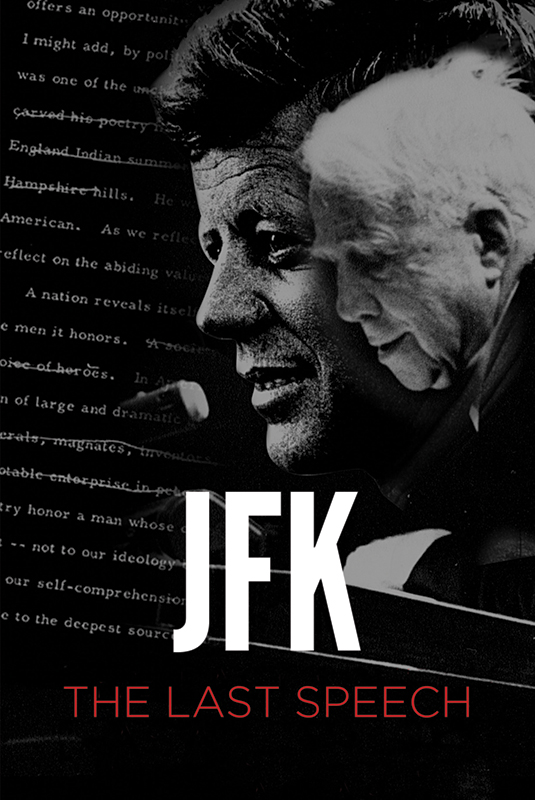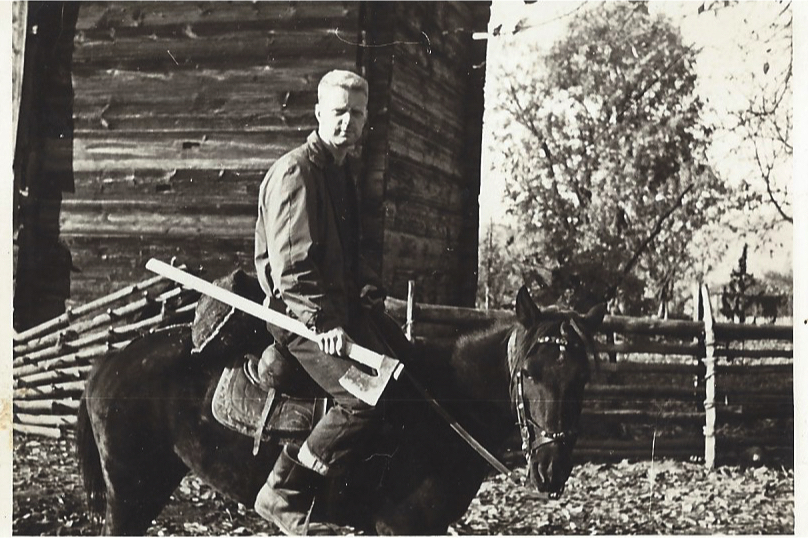By Robert R. Thomas
On Oct, 26, 1963, President John F. Kennedy gave his last public speech, at Amherst College in western Massachusetts. The occasion of Kennedy’s Convocation Address at Amherst was the ground-breaking ceremony for the Robert Frost Library. Frost, an avid friend and supporter of JFK, had taught at Amherst for many years and had died the previous January. A month later, JFK himself would be dead, assassinated in Dallas.
 JFK: The Last Speech is an invaluable guide to that speech and its effective and timely lessons. The book, including 40 essays, most from alums of the Amherst Class of 1964, now in their 70s but still capable of vigorous reflection, is an expanded companion piece to the documentary film of the same title, which has been featured this year on American Public TV, shown on about 50 public stations nationwide. The film is an excellent production, the perfect teaser for the book. [Ed: See Ed Bradley’s review of the film here.]
JFK: The Last Speech is an invaluable guide to that speech and its effective and timely lessons. The book, including 40 essays, most from alums of the Amherst Class of 1964, now in their 70s but still capable of vigorous reflection, is an expanded companion piece to the documentary film of the same title, which has been featured this year on American Public TV, shown on about 50 public stations nationwide. The film is an excellent production, the perfect teaser for the book. [Ed: See Ed Bradley’s review of the film here.]
For Flint readers, as with the film, there is a local angle. Flint resident and EVM Editor-at-large Ted Nelson was a member of the Amherst Class of 1964 and wrote one of the essays, “The Life of an Activist” which culminates with his life in Flint. His wife, EVM Editor Jan Worth-Nelson, was one of three co-editors of the collection with Roger Mills and Neil Bicknell. Other Amherst alums who wrote substantial essays include a retired Albany, New York attorney who donates time to the Muslim community, a Montana rancher supporting arts education to Crow Reservation schools; and a journalist still at work in El Salvador.
Early in his speech Kennedy laid down a challenge to his largely student audience, many of whom were members of the Amherst Class of 1964:
“Privilege is here, and with privilege goes responsibility.”
The effects of this speech on many members of that one graduating class is the heart-beat of this multi-media project centered around what JFK said that day and responses to the heart of his challenge, a challenge he punctuated with:
“There is inherited wealth in this country and also inherited poverty. And unless the graduates of this College and other colleges like it who are given a running start in life–unless they are willing to put back into our society those talents, the broad sympathy, the understanding, the compassion–unless they’re willing to put those qualities back into the service of the great republic, then obviously the presuppositions upon which our democracy are based are bound to be fallible.”
The book is constructed in three parts:
Part 1, “Lighting the Torch,” illuminates the historical scene, the campus of Amherst College in the fall of 1963. The principal reporters are members of the Amherst Class of 1964. Their reports offer an individual richness of voices to the historical setting.

Ted Nelson on his Peace Corps horse in Turkey, 1964. Nelson followed JFK’s call following the 1963 speech documented in the new film and book (Photo by Deborah Clancy).
Part 2, “Doing the Work He Couldn’t Complete,” is all about carrying the Torch. After Kennedy and Frost lit the torch, along came those who carried it with a purpose into their lives. This part of the book is their stories in their own voices. And what a chorus it makes. There follow nine vignettes by more members of the 1964 Amherst Class. Titled Carrying the Torch, the influence of Kennedy’s challenge thrums through each account.
Part 3, “Looking Backward with Pride…Forward with Hope,” is about passing the Torch. Composed of essays and commentaries, this part offers reflection and review from diverse quarters like Fareed Zakaria, Robert Redford, John Meacham, and economist Joseph Stiglitz, (Amherst ’64), as well as several other Amherst ’64 commentators.
Kennedy honored Frost as “one of the granite figures of our time in America. He was supremely two things: an artist and an American. A nation reveals itself not only by the men it produces but also by the men it honors, the men it remembers.”
Reflecting on traditional American heroes as “men of large accomplishments.,” Kennedy added:
“But today this College and country honors a man whose contribution was not to our size but to our spirit, not to our political beliefs but to our insight, not to our self-esteem, but to our self-comprehension.”
Honoring the deepest sources of our national strength and spirit, Kennedy reminded that such strength takes many forms, and the most obvious forms are not always the most significant.
“When power leads man toward arrogance,” he said, “poetry reminds him of his limitations, when power narrows the areas of man’s concerns, poetry reminds him of the richness and diversity of his existence, when power corrupts, poetry cleanses, for art establishes the basic human truths which must serve as a touchstone for our judgment.”
As Frost said, the artist has a lover’s quarrel with the world. In pursuing his perceptions of reality, he must often sail against the currents of his time. While not a popular role, it is a most necessary one for Frost and for Kennedy, who said:
“The artist, however faithful to his personal vision of reality, becomes the last champion of the individual mind and sensibility against an intrusive society and an officious state. The great artist is thus a solitary figure.”
He further amplifies the strengths of the artist and the liberal arts as playing an essential role in society:
“If art is to nourish the roots of our culture, society must set the artist free to follow his vision to wherever it takes him. We must never forget that art is not a form of propaganda; it is a form of truth….In serving his vision of the truth, the artist best serves his nation.”
Earlier in his paean to the role of art, Kennedy had said, “I see little of more importance to the future of our country our civilization than full recognition of the place of the artist.” He concludes with a warning from Frost’s poem, “The Hired Man.”
“And the nation which disdains the mission of art invites the fate of Robert Frost’s hired man, the fate of having nothing to look backward to with pride and nothing to look forward to with hope.”
The speech concludes with a rousing run of hopeful cries like “I look forward to an America which will reward achievement in the arts as we reward achievements in business or statecraft” and ending with “And I look forward to a world which will be safe not only for democracy and diversity but also for personal distinction.”
As enlightening as this multi-media project is, how it came to be as a creation wrought from the fabric of Kennedy’s speech is equally fascinating.
While that day in October of 1963 challenged and transformed them, it was not until plans were being made for the 50th reunion of the Class of 1964 that the idea of JFK The Last Speech began to catch some traction into reality. How that day and that speech put them on Frost’s road less travelled by when they came to the crossroads of poetry and power exemplifies Frost’s philosophy of creating, writing and learning. He felt there was a difference between teaching and learning. He was all about learning and creating real art, believing a thing into existence. Such a thing is JFK The Last Speech. Such a thing is the power of the word, the realm of poet and president alike.
John F. Kennedy, Robert Frost and the Amherst Class of 1964 are well-served by JFK: The Last Speech, a luminous creation filled with timely lessons reverberating from 55 years ago. For those who think history a dead horse, JFK The Last Speech is a multi-media creation that will quickly disabuse one of such virtual delusions. The ultimate result for me was the surprise and satisfaction of a fine learning experience.

Robert Thomas
EVM board member, omnivorous reader and reviewer Robert R. Thomas can be reached at capnz13prod@gmail.com.
A local book launch and for JFK: The Last Speech has been scheduled for 5-7 p.m. Thursday, Oct. 18 at Totem Books, 620 W. Court St. More information available at 810-407-6402.
A special screening of the film “JFK: The Last Speech” has been scheduled for 6-8 p.m. Sunday,Oct. 21 as part of a “Rally the Vote” event co-sponsored by East Village Magazine and the League of Women Voters at the Flint Institute of Arts theater, 1120 E. Kearsley St. Free admission.
JFK: The Last Speech (Mascot Books: $27.95, 376 pp) available at Totem Books, Amazon and from the publisher, mascotbooks.com.


You must be logged in to post a comment.